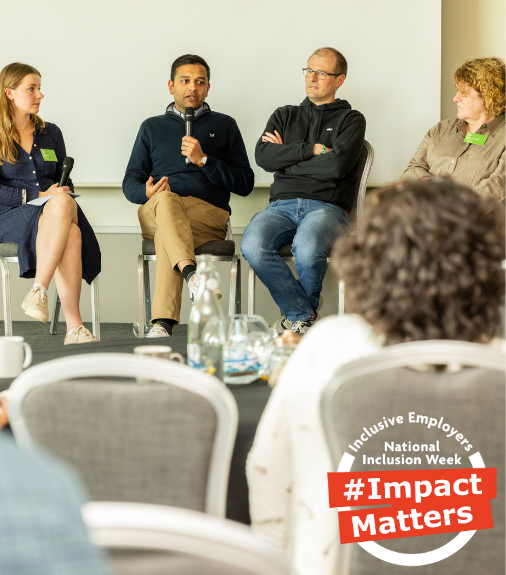
National Inclusion Week’s theme, “Impact Matters,” highlights the importance of understanding and measuring the impact on marginalised groups and taking action for change. At Q5, we believe everyone deserves to be led within a healthy culture. Here are our insights on creating impactful, inclusive environments where everyone can thrive.
Reading time: 5 minutes
The theme for National Inclusion Week this year is “Impact Matters” – which calls for a focus on understanding, identifying, and measuring impact on historically marginalised groups and taking impactful actions for change. National Inclusion Week, running from 23rd-29th September 2024, was created by Inclusive Employers to raise awareness of inclusion in the workplace. This year’s theme seeks to reignite and energise the positive impact of inclusion and showcase that wherever you are at with your inclusion journey, the impact of your work and actions matter.
In 2023, over 9,000 participants took part in National Inclusion Week—with many celebrating with internal events, including training sessions delivered by Inclusive Employers, showcasing their inclusion ‘wins’ and through activities set through the popular National Inclusion Week toolkit. More information about National Inclusion Week and how to get involved is available via the Inclusive Employers website, here.
This is a call-to-action that rings true for us at Q5 and our belief that everyone deserves to be led well, within a healthy working culture.
Here are just a few thoughts from Q5 on the theme of “Impact Matters”…
Many of us will have heard multiple quotes in our organisations about the importance of data. “Data is the new oil,” “What gets measured gets done,” and “You can’t change what you don’t understand.” Quotes like these are as relevant to inclusion as to any other field.
Collecting data that sheds light on how people experience our organisations and cultures is key to identifying the right focus areas for inclusion effort. At Q5, we often work with storytelling and surveys to share insight and identify challenge areas. While qualitative data like storytelling and surveys are important guides for inclusion, HR and business leaders should also seek out the stories that can often be found in their quantitative employee data. Understanding stories about the rates at which diverse and marginalised colleagues flow into (recruitment), up and around (progression), and out of (attrition) organisations is necessary for creating impact-focused change that can be measured and celebrated.
Increasingly, we are hearing from clients that “traditional” line manager learning doesn’t equip managers with the knowledge and tools they need to have a positive impact on all their people. Managers play a critical role in the careers and overall experience of their people, yet we still hear that managers are – or feel – unprepared to manage teams with lived experiences different to their own. Requests for learning and development content that supports managers to lead neurodiverse teams is a particular recent trend we have seen. Organisations taking the time to consider the diversity of their teams and seeking to ensure managers know how to provide a supportive culture where everyone feels they belong can be an impactful focus for inclusion.
Impactful inclusion isn’t only the work of HR teams, DEIB leadership, or management. Everyone can play a role in creating spaces where historically marginalised communities and all colleagues feel included.
At Q5, we recognise that a breadth of diversity can impact how people collaborate. Whenever we create new project teams, they kick off with a short “Working Better Together” workshop or conversation where team members learn more about each other and how they might work best together. These conversations cover topics from preferred pronouns, to how each individual best absorbs information, to personal commitments – like caring responsibilities. Finding moments for inclusion impact ‘in the flow of work’ like this can help to make inclusion a part of how you do business, and share the awareness that inclusion impact does matter, and it’s everyone’s responsibility.
